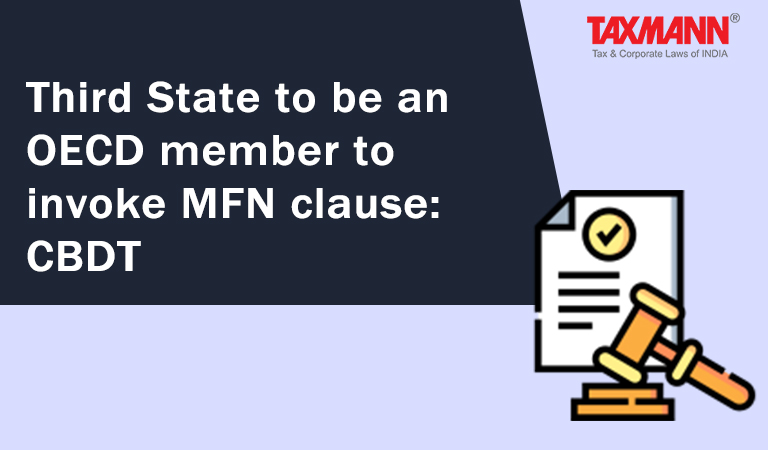Third State to be an OECD member to invoke MFN clause: CBDT
- Blog|News|Income Tax|
- < 1 minute
- By Taxmann
- |
- Last Updated on 7 February, 2022

Circular no. 3/2022, dated 03-02-2022
The Central Board of Direct Taxes (CBDT) has received representations seeking clarity on the applicability of the MFN clause available in the Protocol to some of the DTAAs with OECD member States. Given the various decrees/bulletin/publication on interpretation of the MFN clauses, the CBDT issued certain clarifications on the applicability of the M FN clause.
The board has clarified that the third State has to be an OECD Member State on the date of the conclusion of DTAA with India to apply the MFN clause. The board has said that India has not issued any notification importing the benefit of treaties with Slovenia, Lithuania and Colombia to treaties with The Netherlands, France or the Swiss Confederation.
The CBDT also clarified that where there is any decision by any court on the issue favourable to the taxpayer, this Circular will not affect the implementation of the court order in such case.
Click Here To Read The Full Notification
Disclaimer: The content/information published on the website is only for general information of the user and shall not be construed as legal advice. While the Taxmann has exercised reasonable efforts to ensure the veracity of information/content published, Taxmann shall be under no liability in any manner whatsoever for incorrect information, if any.

Taxmann Publications has a dedicated in-house Research & Editorial Team. This team consists of a team of Chartered Accountants, Company Secretaries, and Lawyers. This team works under the guidance and supervision of editor-in-chief Mr Rakesh Bhargava.
The Research and Editorial Team is responsible for developing reliable and accurate content for the readers. The team follows the six-sigma approach to achieve the benchmark of zero error in its publications and research platforms. The team ensures that the following publication guidelines are thoroughly followed while developing the content:
- The statutory material is obtained only from the authorized and reliable sources
- All the latest developments in the judicial and legislative fields are covered
- Prepare the analytical write-ups on current, controversial, and important issues to help the readers to understand the concept and its implications
- Every content published by Taxmann is complete, accurate and lucid
- All evidence-based statements are supported with proper reference to Section, Circular No., Notification No. or citations
- The golden rules of grammar, style and consistency are thoroughly followed
- Font and size that’s easy to read and remain consistent across all imprint and digital publications are applied



 CA | CS | CMA
CA | CS | CMA

ITAT: CBDT Circular on MFN Clause transgresses Sec.90(1), neither binding on ITAT nor retrospective
[TS-79-ITAT-2022(PUN)]
Pune ITAT holds that CBDT Circular No. 3 of 2022 dt. Feb 3, 2022 specifying the need for a separate notification for importing the beneficial treatment from another DTAA cannot have a retrospective effect; Observes that once DTAA is notified all its integral parts, including Protocol, get automatically notified and there remains no need to again notify the individual limbs of the DTAA; On analysis of the Circular, ITAT observes that, “it becomes ostensible that the CBDT has mandated the issuance of a separate notification for importing the benefits of a treaty with second State into the treaty with the first State” by relying on provisions of Section 90(1); Further observes that the Circular specifying the need for a separate notification for importing the beneficial treatment from another DTAA as a corollary of Section 90(1) overlooks the plain language of the provision in juxtaposition to the language of the Protocol, which treats the MFN clause an integral part of the DTAA; Opines that it is trite law that a CBDT Circular is binding on the AO and not on the assessees or the ITAT or other appellate authorities and the Circular transgressing the boundaries of section 90(1) cannot bind the ITAT; Observes that the Circular attaches a new disability of a separate notification for importing the benefits of a DTAA with the second State into the treaty with first State, thus, cannot operate retrospectively to the transactions taking place in any period prior to its issuance; The appeal before ITAT pertained to AY 2016-17 and involved invocation of MFN clause under the Protocol to India-Spain DTAA by resorting to India-Portugal DTAA for taxability of royalty/FTS at a lower rate or 10%.:ITAT PUN
The ruling was delivered by the Division Bench of Pune ITAT comprising Shri R.S. Syal, Vice President and Shri Partha Sarathi Chaudhury, Judicial Member.
Mr. Siddhesh Chaugule appeared for the Assessee while the Revenue was represented by Mr. Shivraj B More.
Could you please report this judgement in your case laws section?